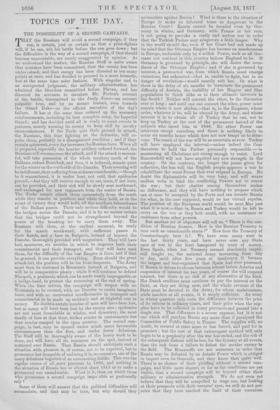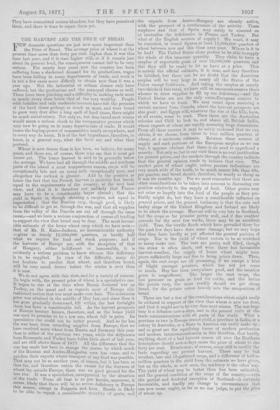TOPICS OF THE DAY.
THE POSSIBILITY or A SECOND CAMPAIGN. THAT the Russians will avoid a second campaign, if they can, is certain, just as certain as that a prize-lighter will, if he can, win his battle before the sun goes down ; but the difficulties in the way of a second campaign, if that should become unavoidable, are surely exaggerated by opinion. As we understand the matter, the Russian Staff is quite aware that mistakes have been committed, that the enemy has been undervalued, and that energy has been directed to too many points at once, and has decided to proceed in a more leisurely, but at the same time safer fashion. With singular and to us unexpected judgment, the military administration has admitted the blunders committed before Plevna, and has directed its servants to circulate Mr. Forbes's account of the battle, transmitted to the Daily News—an account palpably true, and by no means lenient, even towards the Grand Duke—as the official narrative of the day's failure. It has at the same time ordered up the necessary reinforcements, including its best complete army, the Imperial Guard ; and has decided until all is ready to await events in patience, merely warning its enemy to keep still by cavalry reconnaissances. If the Turks quit their ground to attack, the Russians, this time fighting on the defensive, will re- pulse them, probably in a disorganised condition ; and if they remain quiescent, every day increases theRussian force. When all is prepared, especially the heavier artillery ordered forward, the Russians will recommence the attack, and if the attack is success- ful, will take possession of the whole territory north of the Balkans, reduce Rustchuk, and then, it is believed, remain quiet for the winter on the south side of the Danube. Their covering will be indifferent,their suffering from sickness considerable,—though be it remembered, it is under heat, not cold, that epidemics prevail,—but they will receive enough to eat, tents, if not huts, can be provided, and their sick will be slowly sent northward, and exchanged for new regiments from the centre of Russia. The Turks cannot attack them successfully from the south while they remain in position, and while they hold, as in the event of victory they would hold, all the northern debouehures of the Balkan passes. Their only serious difficulty would be the bridges across the Danube, and it is by no means certain that the bridges could not be strengthened beyond the power of the breaking ice to carry them away. The Russians will then, at the earliest moment, be ready for the march southward, with sufficient passes in their hands, and a base in Bulgaria, instead of beyond the Danube, thoroughly provided with magazines. They will have had, moreover, six months in which to improve both their commissariat and their transport, and they will have used them, for the difficulty of the vast Empire is time, and if that be granted, it can provide everything. Even should the great attack fail, the position will be far from desperate. The Army must then, be cantoned in Roumania instead of Bulgaria, and will be in comparative plenty ; while it will continue to defend Nicopoli, a peninsula which can be made nearly impregnable, as a bridge-head, to protect the recrossing at the end of spring. When the time arrives, the campaign will reopen with no Roumania to be crossed, with no Danube to excite imaginary fears, and with no unrevealed insufficiencies in transport and commissariat to be made up suddenly and at frightful cost in money. No doubt a certain number of men will have been lost, but as many will have been lost by the enemy also ; epidemics are not most formidable in winter, and dysentery, the most deadly of foes at that time, strikes armies in cantonments less than armies camped in the open country. The second cam- paign, in fact, may be opened under much more favourable circumstances than the first, and under fewer delusions. The Staff will be thoroughly aware of the heavy work to be done, and will have all its resources on the spot, instead of scattered over Russia. That Russia should anticipate such a situation with pleasure is, of course, not to be expected, but to pronounce her incapable of enduring it is, we conceive, one of the many delusions begotten of an unreasoning dislike. This was the regular course of all ,wars previous to 1860, and nothing in the situation of Russia has so altered since 1815 as to make a protracted war unendurable. What is it, then, on which those who pronounce a second campaign impo:sible so profoundly rely ?
Some of them will answer that the political difficulties will accumulate, and that may be true, but why should they
accumulate against Russia ? What is there in the situation of Europe to make an informal truce so dangerous to the Russian Court ? Russia cannot be invaded even by Ger- many in winter, and Germany, with France in her rear, is not going to provoke a costly and useless war in order that the Turkish Pashas may misgovern a little longer. Why in the world should she, even if her Court had not made up its mind that the Ottoman Empire has become an anachronism in Europe, endurable only by a selfish Power, such as all Ger- mans not resident in this ,country believe England to be. If Germany is governed by principle, she will desire the over- throw of the Ottoman Empire ; and if she is governed by interest, a protracted war, from which Russia must emerge victorious, but exhausted—that is, unable to fight, but in no danger of revolution—would exactly suit her. Or what is there in the delay of six months to terminate the permanent, difficulty of Austria, the inability of her Magyar and Slav populations to think alike as to their ultimate interests in the South ? Neither will convert the other, be the discussion ever so long ; and until one can convert the other, power must remain where it now abides,—that is, in the Emperor, whose order, whatever it be, will be obeyed by the Army, and whose interest it is to obtain all of Turkey that he can, not to keep up Turkey at the cost of the permanent hatred of the subjects who saved him in 1848. No other Power can intervene except ourselves, and there is nothing likely to occur six months hence which does not now tempt us to inter- vene. The result of the war will be as uncertain as ever. Turkey- will have employed the interval—unless indeed the Czar threatens to hold the Pashas personally responsible massacring all Christians not strong enough to resist. Lord Beaconsfield will not have acquired any new strength in the country. On the contrary, the longer the pause given for reflection, the less will the English people approve a war to rehabilitate the worst Power that ever reigned in Europe. No
the diplomatists will be very busy, and will weave endless webs to bind the conflicting Powers not to renew the war ; but their chatter among themselves makes. no difference, and they will have nothing to propose which can at once be accepted by the Porte and can console Russia for what, in the case supposed, would be her virtual repulse. The position of the European world would be next May just what it is now,—that is, Russia and Turkey would be left to carry on the war as they best could, with no assistance or resistance from other powers.
But another set of objectors will tell us, " There is the con- dition of Russian finance. How is the Russian Treasury to bear such an unendurable strain ?" How does the Treasury of Constantinople bear it ? We have seen many wars in. the last thirty years, and have never seen any State once at war in the least hampered by want of money. Even Spain, when her Treasury seemed absolutely empty, still fought on, the national Army increasing from day to day, until after five years of insolvency it became the largest and best-organised that Spain had ever possessed. If Russia is driven to choose between retreat before Asiatics and suspension of interest for two years, of course she will suspend interest, but there is no risk of any alternative of the kind. Her Dutch creditors must continue to pay the interest on the Debt, as they are doing now, and the whole revenue of the State must be devoted to the Army, for whose maintenance, while inactive at all events, it is amply sufficient. An army in winter quarters only costs the difference between the price of its rations in ordinary times, and their price when the sup- plies have to be collected in many provinces and poured into a single one. That difference is a severe expense, but it is not one which will paralyse Russia any more than it paralysed the Committee of Public Safety in France. The supplies will, no doubt, be secured at rates more or less forced, and paid for in promises ; but the cost of that extravagant method will only begin to be a perplexity after the war has ended, and the risk of the subsequent distress will be less, for the dynasty at all events, than the risk from a failure to defeat the secular enemy in the field. The Romanoffs arc not autocrats in order that Russia may be defeated by an Asiatic Power which is obliged to import even its Generals, and they know that quite well. There is no chance of their yielding without a second cam- paign, and little more chance, so far as the conditions are yet visible, that a second campaign will be beyond either their military or administrative strength. We do not even yet believe that they will be compelled to wage one, but looking at their prospects with their enemies' eyes, we still do not per- ceive that they have reached the limit of their resources.
They have committed serious blunders, but they have perceived them, and there is time to repair them yet.































 Previous page
Previous page